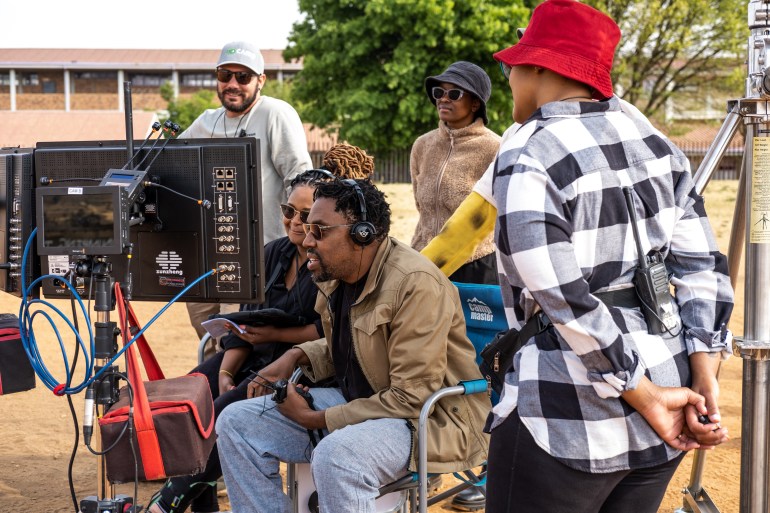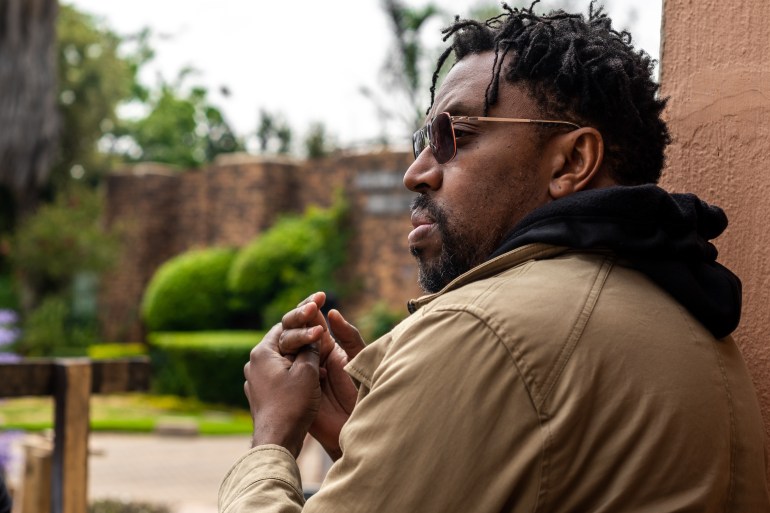How Kagiso Lediga became the most sought-after filmmaker in South Africa | Arts and Culture

As a teenager in drama school in Cape Town in the 1990s, Kagiso Lediga was bored by the heavy focus on theatre and Shakespeare in the curriculum. For a teenager who had grown up in Pretoria, he thought he had seen far more interesting things.
Lediga’s mum trained as a nurse but was a hustler who was always hawking all kinds of secondhand items on the side. His father worked as a manager for a transport company and then as an insurance salesman. As a kid, Lediga would often accompany his father as he knocked on doors.
“People would offer us tea and biscuits while we listened to their stories,” he recalls. “No disrespect to my dad but in my head, selling insurance became the backup plan for my life if every other thing I was interested in failed.”
Eventually, he dropped out of school. But these days, Lediga, now one of Africa’s most prolific comedians and filmmakers wishes that he’d taken school a bit more seriously, even if he doesn’t regret his decision.
“Looking back, I should have appreciated the training a bit more but at the time I thought it was s***, certainly not the Spike Lee stuff that I wanted,” he tells Al Jazeera.
To a large swath of South African audiences, the 45-year-old is a veteran of standup comedy, and the brain behind the short-lived but culturally resonant variety hit, The Pure Monate Show, that ran from 2003-2004. To a later group of fans, he is an actor and filmmaker, whose vision gave birth to the coming-of-age drama, Matwetwe, in 2017 and the romantic comedy, Catching Feelings, the following year. Following a berth in local theatres, Catching Feelings was the first South African film to stream globally on Netflix.
The positive response to that film led Lediga to his biggest audience yet.
In 2018, Netflix was looking to launch its original programming on the continent and was engaging with local filmmakers. Lediga immediately pitched the story of a female spy travelling across the continent hunting down bad guys and state secrets. This idea became the six-episode Queen Sono, a colourful, country-hopping spy thriller with Pearl Thusi in the titular role.
Lediga believes Queen Sono was the perfect show for a global brand like Netflix to make its presence felt on the continent.
“With streamers, there has been a lot of trial and error and I commend Netflix because they have been groundbreaking in that regard,” he tells Al Jazeera via Zoom from New York. “Trying to figure out content for a diverse continent such as ours is tough. And with Queen Sono that was always on our minds. We have 1.5 billion people in this space, and this chick from Johannesburg navigating these complexities. It was a window into these different cultures.”
Netflix loved Queen Sono until it didn’t.
In the thick of the COVID-19 pandemic, the show was cancelled unceremoniously, reversing an earlier decision to renew it for a second season. Lediga admits he was disappointed and would love to return to that world if handed an opportunity, “Queen Sono opened a lot of doors. I still think it is an awesome idea and would like to see a film. It is a fun world and if the stars align, maybe we can do one or two movies just to wrap things up properly.”
In the meantime, he has continued to work with Netflix on a slate of other projects through the production company Diprente that he co-runs with his partner, Tamsin Andersson. Classified, a young adult drama about a high school student who moves from California to Johannesburg and becomes caught up in international espionage is licensed to Netflix for the Africa region, debuting on the platform in November last year. The show, a co-production with American partners, has Lediga serving as creator, writer, showrunner, and lead director and will stream on Amazon Freevee in the United States sometime this year.
Lediga and Andersson are also life partners who have a teenage son. They met in 2004 and started dating almost immediately. Their working relationship started six years later when Andersson joined Lediga to produce the Late Nite News with Loyiso Gola, South Africa’s answer to The Daily Show with Jon Stewart. Coincidentally, Trevor Noah, who worked the standup circuit with Lediga would be named host of The Daily Show years later.
Fish out of water
Before he was the go-to guy for creating content for global platforms, Lediga was an awkward and curious kid growing up in Pretoria, South Africa’s administrative capital. The older of two children, he spent a lot of time studying the adults around him. His younger sister Karabo is also a writer and filmmaker who has worked with Lediga on Queen Sono and Classified.
He wanted to work in insurance like his father if his creative career stalled, but these days, things have changed. “When I began to find success as a creative, I upgraded my backup plan to working in advertising. I suppose if I a** out, I could always find work somewhere peddling ideas for selling toothpaste.”
When Lediga was 13 his parents separated, and he went to live with his mum who was more liberal and encouraged his creative interests. His coming of age coincided with the fall of apartheid and Lediga took advantage of the cultural blossoming that followed. After years of suffering a cultural boycott, the country was now opening up, and with this came the influx of entertainment media from all over the world.
Lediga found himself gravitating to the storytelling antics of Bill Cosby and the weirdly specific humour of Woody Allen – men he recognises are problematic today. “I know this is bad and will probably come back to haunt me. I don’t even know how I came across these films in the townships of Pretoria.”
Inspired by his idols, Lediga fancied himself the kind to get a film school education in the United States. But his single mother could not afford to support such dreams. Studying dramatic arts at the University of Cape Town made the most sense because it was the closest thing to cinema and was affordable.
As a teenager on campus suddenly thrust into a multicultural environment, he says he felt like a fish out of water. “I don’t know what you know about Pretoria but that is the headquarters of apartheid. It was an interesting place to grow up, very insular. Going to UCT was a crazy opening up of the world.”
Lediga spent a lot of his time with some kids who had the resources to make their own short films. He would act in their amateur shorts while soaking up whatever practical knowledge possible. This training connected him to a network of aspiring filmmakers. At some point, he found himself cast as an extra on a commercial shoot directed by French filmmaker Luc Besson.
His adventures – and the boring curriculum – took him away from class a lot of the time and his grades suffered. After his third year, he left school voluntarily without graduating.
“I had run out of the three-year target that I had given myself to make it work because of my mum’s limited finances,” he says. “I wasn’t excelling academically, but I could not tell my mum I was kicked out, so I had to appeal and once I was allowed back in, I never went back.”

‘I grew up’
Lediga always considered himself a storyteller. Standup comedy with its low barrier of entry, presented the most cost-effective route for a broke student to embark on this journey but building a professional profile was not easy. There weren’t many active Black standup comedians to look up to and as such no template to follow. At the time, the standup field was the preserve of white comedians like Leon Schuster who would often dabble in Blackface when presenting culturally diverse material.
Performing local clubs in Cape Town and later Johannesburg where he moved to try to make it as a writer, Lediga learned to tackle new audiences. He explains, “I grew up towards the end of apartheid so standup was a great cultural ice breaker because I was doing comedy for mostly rich white audiences. He continues, “At this time there had never really been a conversation going on between whites and Blacks so it was always this fun adrenalin rush to go into rooms full, of people who didn’t quite know if I was doing protest theatre or plain comedy. It would be awkward at first, but they would slowly get into it.”
If anyone in the newly independent South Africa wondered what standup comedy would look or sound like if delivered to mainstream audiences by a college-educated Black man from a working-class background, Lediga was the answer. He was part of a new wave of comedians that included David Kau, Riaad Moosa and Conrad Koch, all established acts today.
Television followed as Lediga sought to attract a wider audience. He was hired to write jokes and opening monologues but soon graduated to doing sketches on The Phat Joe Show, a local television gig hosted by media personality Majota Kambule.
Then Lediga started the Pure Monate Show, a comedy sketch series inspired by Monty Python and In Living Color. Pure Monate Show aired on national television and became an unlikely cult hit. Lediga and a cross-cultural mix of sharp, new-school male comedians translated their stage material to fit the dynamism of the small screen.

Going global
It was his big break as audiences responded to the irreverent takedown of politicians, newsmakers and the culture. No one was safe from the biting satire. This goodwill kept it on air for two seasons before it was cancelled by a more conservative-leaning commissioning board. He says 20 years later, people still walk up to him to demand more episodes.
“I have fond memories of that show, some episodes of which I still have on VHS,” Menzi Mhlongo, project manager for the Durban FilmMart Institute tells Al Jazeera. “What’s truly inspiring about Kagiso is his ability to blend humour with social commentary. He tackles critical social issues in his work, challenges mindsets and sparks important conversations.”
Filmmaker John Barker who helmed episodes of the show and has collaborated extensively with Lediga after says he is an interesting character.
“The films he’s made, the comedians he’s helped … he is a brilliant mind and a superb creative. Jo’burg would be a much less creative space the last 20 years if he wasn’t in it,” he says.
Rebounding from the disappointment of Pure Monate Show’s cancellation, the duo pooled resources together and self-financed the road comedy, Bunny Chow with Barker directing and Lediga starring in. It premiered at the Toronto International Film Festival and gave Lediga the legitimacy to call himself a filmmaker.
But Barker says Lediga has always had it in him,. “I think he has got so much potential, and I hope as he gets older, he doesn’t get caught up doing work only for certain corporations. Because I think his most fantastic stuff is improv, just going for an idea and taking it further and further.”
Returning to television in 2010, Lediga, Andersson and Gola, an alumnus of the Pure Monate Show, created Late Nite News, a satirical weekly series fronted by Gola. It ran for five years and was nominated for two international Emmy awards. Lediga says the show was rested because it ran its course. “Everybody was tired! Loyiso wanted to take his standup act on the road. Two of the guys left to go work with Trevor Noah in America and I wanted to make movies.”
Working with streaming platforms on several projects, Lediga is aware of critics who have expressed fears about the risk of shedding authenticity in these stories in order to fit into genre structures that can attract foreign audiences. He tells Al Jazeera, “Personally, I am a creative. I am not in the business of streaming. I think it is for the businesspeople to figure out what works on their platforms.” He adds, “I gravitate to stories and co-creators that excite me. Every story comes from somewhere and that specificity can make it universal.”



